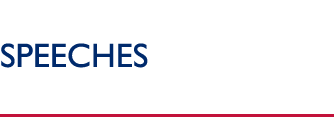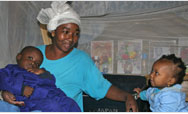 |
 |
|
 |
 |
 |
- 01/08/09: Remarks by Henrietta H. Fore, Director of Foreign Assistance and USAID Administrator, at the U.S. Institute of Peace - "Commentary on the Secretary of State’s Opening Remarks on 'Today’s World, Tomorrow’s Challenges.'"
- 01/07/09: Remarks by Henrietta H. Fore, Director of Foreign Assistance and USAID Administrator, at Building Partnerships: Development in Diverse Muslim Societies
- 12/10/08: Remarks by Dr. Kent Hill, Assistant Administrator for Global Health, at the International Human Rights Week Event
- 12/09/08: Remarks by Henrietta Fore, Administrator, USAID and Director of U.S. Foreign Assistance, at the Society for International Development
- 11/28/08: Remarks by Henrietta Fore, Administrator, USAID and Director of U.S. Foreign Assistance, Doha Financing for Development International Conference - "Assessing the Global Financial System and Next Steps for Ensuring Stable Financial Flows for Development"
 RSS Feed for Recent USAID Speeches and Testimony RSS Feed for Recent USAID Speeches and Testimony
|
|
 |
 |
|
Remarks by Henrietta Fore
Director of U.S. Foreign Assistance and Administrator, USAID
Commentary on
the Secretary of State’s Opening Remarks on
"Today’s World, Tomorrow’s Challenges."
U.S. Institute of Peace
Washington, DC
January 8, 2009
Good morning everyone.
Thank you Dick [Solomon] for those kind words and for your many years of service as president of the U.S. Institute of Peace. I carry Secretary Rice’s greetings and her regrets for not being with you this morning. She was scheduled to speak, but has been delayed in New York. She has been working around the clock to end the violence in Gaza. She appreciates the outstanding work of the Institute and your foresight in putting together what will, no doubt, be a fascinating and timely discussion as we transition to a new Administration.
I will begin with a few of the Secretary’s thoughts and then add a few of my own.
The Institute of Peace was founded in 1984, during the last great ideological struggle of the 20th century -- the struggle against Soviet Communism. It was a struggle that was eventually won by freedom because of peace through strength, and because of the help of the Institute of Peace.
We are in a different struggle today, an ideological struggle against violent extremism and forces against freedom and justice. Forces that reminded us all on September 11, 2001 that the safer, more peaceful and prosperous world, of which we all dream, requires the leadership of the United States and the strong partnership of our friends and allies.
At the center of this work has been the Middle East.
In the last eight years, this Administration has put the country on a course where we have built a different foundation for a different kind of Middle East.
- The United States is, of course, deeply concerned about the situation in Gaza; with the humanitarian situation clearly worsening. The ongoing attacks against Israel and the decision that Hamas made not to respect the previous period of calm shows us that when this ends there must be new arrangements in place, not a return to the status quo. It is imperative that any ceasefire is durable and sustainable, and that it ensures the safety and security of Israelis and Palestinians alike.
Many challenges remain between the Israelis and Palestinians but we all are hopeful that through the framework put in place, the Annapolis process, Palestinians and Israelis will one day reach an agreement for lasting peace.
- Today, because Saddam Hussein’s Iraq is gone, there is truly a chance for a better future for the Middle East. For the first time in history, Iraq has a democratically elected prime minister, and it is a multiethnic democracy and a friend of the United States, rather than an Iraq that is invading its neighbors and using weapons of mass destruction.
- And in Lebanon, Syrian forces are gone because of the policies of this Administration.
- Beyond the Middle East, democracy is on the rise. In Afghanistan, after years of living under the oppressive Taliban, we now have a democratically elected government.
Indeed, throughout U.S. foreign policy, we have seen significant achievements.
- With North Korea, we have made progress towards denuclearization within a context of the Six Parties. Step by step, we’ve been going through the North’s commitments, and when the North has gone forward with its obligations, the U.S. has responded.
- Across the developing world, the U.S. enjoys strong working relationships, particularly with China, India, Brazil, Colombia and Chile, which brings us to Development.
With these diplomatic achievements under the Secretary’s leadership, we have also made important gains in rebuilding our development capacity.
As Director of United States Foreign Assistance and as the Administrator of USAID, the Secretary and I have worked closely to implement her transformational diplomacy agenda – to build and sustain democratic, well-governed states that will respond to the needs of their people.
As President Bush recently stated at the White House Summit on International Development in October, [quote] America is committed -- and America must stay committed -- to international development for reasons that remain true regardless of the ebb and flow of the markets. We believe that development is in America's security interests.
We believe that we ought to remain committed to development because it is in our long-term economic interests. And we're committed to development because it's in our moral interests [endquote].
We have all been witness to – and it has been a distinct honor to be part of – the most ambitious development agenda since the Marshall Plan. In overall financial terms, since 2001, the United States has nearly tripled our foreign assistance worldwide. In Africa, we are on track to quadruple this assistance. In Latin America, overall levels have doubled.
We are the largest bilateral donor of official humanitarian and food aid in the world. We were among the first to respond to victims of the Indian Ocean tsunami of 2004, the South Asian earthquake of 2005, the cyclones in Bangladesh and Burma in 2007, and the hurricanes in the Caribbean this past summer. Where there is disaster, we respond quickly and effectively.
We also are dedicated to building lasting peace in war-torn countries like Liberia, where, since the end of the civil war, we have provided over $900 million in direct bilateral support.
Where there is disease, the United States has provided hope to the ailing. In 2003, the Administration launched the President’s Emergency Plan for AIDS Relief – PEPFAR. This program is the largest commitment by a single country in human history to combat a single disease.
Where there is opportunity, the United State s has sought partnership. One of my top priorities to achieve greater development impact has been to attract the resources, technology, and expertise of the private sector. In the past year, USAID has created 225 new partnerships, leveraging almost $650 million dollars in private sector contributions.
When the global financial crisis threatened foreign assistance, President Bush announced that the United States would keep its development pledges and its commitment to the developing world. We were the first country to make this clear.
This Administration has also strengthened accountability in foreign assistance – working to ensure that aid produces results, fosters economic growth, and promotes good governance.
The creation of the Millennium Challenge Corporation and the launch of foreign aid reform are two clear examples.
By supporting effective development, the United States strengthens our allies, builds capable partners, and preempts or mitigates conflicts. We have reached a “tipping point” where the importance of development and the need to build the capacity of civilian agencies is well understood throughout the government. This is why this administration explicitly elevated development, making it integral to United States foreign policy alongside defense and diplomacy. The 3D’s of national security.
To build this capacity in USAID, we recently launched the Development Leadership Initiative (DLI). Our goal is to double the USAID’s Foreign Service workforce over the next three years and I hope we will double it again over the following few years. This initiative will enable USAID to better advance development goals on the ground, and work more closely – and effectively – with our country partners.
Improving American foreign assistance has never been more important to our national security as it is today. This has been a transformational period of rethinking and revitalizing our approaches to foreign assistance.
As we pass the baton, we are passing on a few of our lessons learned:
- Planning and integrating our defense, diplomatic and development efforts are key to our security as a nation and our commitment to doing so must remain strong;
- It is important that we continue to invest in a safer and more secure future by keeping our development commitments, particularly in the midst of a global economic slowdown. We have lead our development partners in doing so, and we must remain in the lead;
- We must continue to keep our commitments to rebuilding our diplomatic and development staff throughout the world, increasing our presence and deepening our expertise, particularly in languages.
- As we pass the baton, continue to focus on public and private interests and partnerships and with all types of private sector partners: U.S. and multinational companies, foundations, universities, think tanks… This is the strongest trend for our shared future and in it lie the seeds for a safer, more peaceful and prosperous world.
I would like to end here with best wishes from Secretary Rice and myself from the Diplomatic and Development Institutions. We want to thank the U.S. Institute of Peace and its remarkable president, Dick Solomon, and I look forward to continuing this discussion later today at the Economic Development and State Building Panel.
Back to Top ^
|


